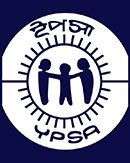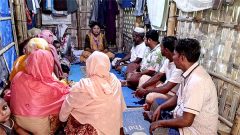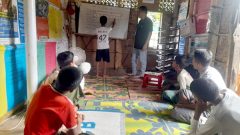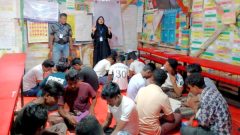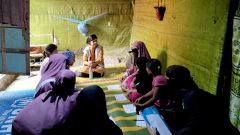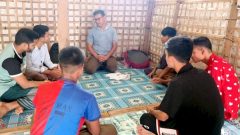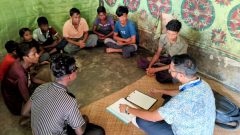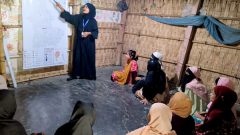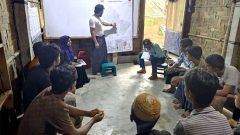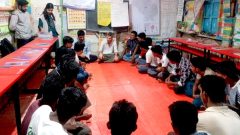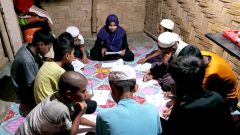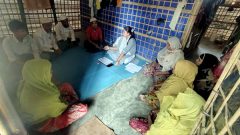Photo Gallery
Implemented By: Young Power in Social Action (YPSA)
Supported By: Norwegian Refugee Council (NRC)
Funded By: NORAD Flexi
Project Duration: July to December 2025
Introduction
Due to the ongoing conflict, violence, and humanitarian crises in Rakhine State, Myanmar, thousands of Rohingya refugees continue to flee to Bangladesh in search of safety and protection. According to the Refugee Relief and Repatriation Commissioner (RRRC), approximately 118,000 new refugees have arrived in the past year, while unofficial estimates suggest the number may be as high as 200,000.
Recognizing the urgent need to support these new arrivals—particularly in the areas of education and psychosocial well-being Young Power in Social Action (YPSA), with the support of the Norwegian Refugee Council (NRC), implementing the “Education in Emergency (New Arrival) for Rohingya Refugees” project in July 2025.
The project, running from July to December 2025, focuses on new arrival adolescents and youth aged 13–24 years residing in five targeted camps: Camp 03, Camp 04, Camp 09, Camp 10, and Camp 13.
Through this initiative, YPSA aims to ensure access to inclusive, safe, and quality education for displaced young people while addressing their psychosocial and emotional needs. The project serves as an immediate response to help restore hope, learning opportunities, and a sense of normalcy for Rohingya adolescents and youth navigating life in displacement.
Methodology
The Education in Emergency (New Arrival) for Rohingya Refugees adopts a flexible, inclusive, and learner-centered approach designed to support children and youth affected by crisis. It emphasizes safe, supportive learning environments that promote psychosocial wellbeing, foundational learning, and life skills through non-formal education.
The EiE project uses a non-formal, learner-centered methodology that integrates academic learning, psychosocial support, and community participation. It aims to promote psychological wellbeing, resilience, and personal growth among crisis-affected youth.
The learner’s sessions included-
- Better Learning Programme (BLP): Focuses on mental health and psychosocial support (MHPSS), helping learners manage stress, improve concentration, and create a positive learning environment.
- First Line Emergency Response (FLER): Provides foundational literacy and numeracy skills for learners who missed formal education opportunities, incorporating social-emotional learning.
- Youth Education Pathway (YEP): Equips adolescents and youth (ages 13–24) with life skills, leadership abilities, and vocational awareness for confidence and self-reliance.
- Parent’s session: Regular parents/caregiver meetings are conducted to increase parental awareness of education’s importance and promote home-based support for learners. YPSA also collaborates with Mahjis and community leaders to build trust, improve outreach, and ensure learner safety and participation.
Achievements
The “Education in Emergency (New Arrival) for Rohingya Refugees” project achieved significant progress in enhancing access to education, wellbeing, and life skills for newly arrived adolescents and youth in the targeted camps.
- The project targeted to reach 3,000 new arrival adolescents and youth across Camps 03, 04, 09, 10, and 13. Total 1658 new arrivals were enrolled with this project activities. Among them 865 are male and 793 are female.
- The project team conducting structured sessions under BLP, FLER, and YEP modules improved literacy, numeracy, and psychosocial wellbeing among the enrolled Rohingya new arrival adolescents.
- Safe, inclusive learning spaces were selected to support learners’ self-expression, behavior improvement, and emotional regulation.
- Youth participants becoming aware risk and hazard, camp service map, wellbeing, self-management, gaining leadership, decision-making, and peer-support skills through FLER, BLP and YEP activities.
- Regular meetings between YPSA and NRC strengthened coordination, adaptive management, and joint planning for improved project delivery.
Strengths
The EiE project implemented by YPSA, in collaboration with NRC, has demonstrated several notable strengths contributing to its effectiveness and sustainability. These strengths reflect the project’s well-planned approach, community-driven implementation, and alignment with the educational and psychosocial needs of Rohingya learners.
The YPSA Education in Emergencies (EiE) project stands out as one of the few direct interventions addressing both the educational and psychosocial needs of newly arrived Rohingya populations. Collaboration with the Norwegian Refugee Council (NRC) has provided crucial technical and financial support, significantly enhancing the project’s quality, effectiveness, and accountability.
Community-based engagement through Majhis and local leaders has strengthened ownership and ensured sustained participation throughout the project’s implementation. A strong focus on gender inclusion has successfully promoted the participation of female learners and caregivers while respecting cultural sensitivities.
Additionally, both YPSA and NRC have established access and existing operational structures within the targeted camps, offering a solid foundation and additional support when needed.
Challenges
Despite of the project’s significant achievements, several challenges have affected the smooth implementation and continuity of educational services for Rohingya new arrivals. These challenges mainly stem from contextual constraints within the camps and operational limitations faced by both staff and partners.
The scattered settlements of new arrivals make it difficult to locate and consistently engage all learners. Overcrowded camps and limited shelter options further complicate the regular delivery of educational activities. Movement restrictions for staff and host teachers have at times disrupted scheduled sessions, creating gaps in learning continuity.
Cultural and gender-related barriers also limit male staff from conducting sessions with female learners and caregivers, posing additional operational challenges. Moreover, the absence of accurate data and clear policy frameworks has delayed essential assessments and approvals needed for smooth project implementation.
Also, the shortage of suitable venues within the camps continues to hinder both the consistency and overall quality of learning sessions, affecting the project’s reach and impact.
Way Forward
Building on the lessons learned and achievements of the EiE project, several strategic actions are proposed to strengthen future implementation and ensure sustainable impact. The following steps aim to improve accessibility, coordination, and inclusiveness of education services for Rohingya new arrivals.
- Conduct sessions in accessible and safe community spaces closer to learners’ homes.
- Continue enrollment drives with the support of Block Majhis, CiC offices, and site management authorities.
- Strengthen coordination with NRC and government stakeholders to develop policy guidelines and SOPs for new arrivals.
- Establish a comprehensive inter-sectoral data management system for better tracking and planning.
- Identify or rent suitable venues to ensure session continuity and learning quality.
- Prioritize recruitment of qualified female facilitators to promote gender-sensitive education.
- Maintain regular coordination meetings for joint review, adaptive management, and strategic advocacy.
The Education in Emergency (New Arrival) for Rohingya Refugees project embodies YPSA’s commitment to ensuring that no young person is left behind in crisis. By combining education, psychosocial support, and community engagement, the project not only enhances learning outcomes but also restores dignity, hope, and resilience among Rohingya adolescents and youth striving to rebuild their lives in displacement.
